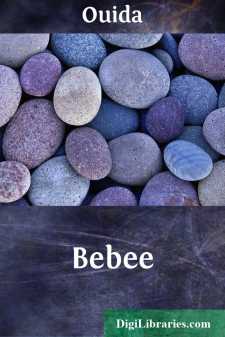Categories
- Antiques & Collectibles 13
- Architecture 36
- Art 48
- Bibles 22
- Biography & Autobiography 813
- Body, Mind & Spirit 142
- Business & Economics 28
- Children's Books 17
- Children's Fiction 14
- Computers 4
- Cooking 94
- Crafts & Hobbies 4
- Drama 346
- Education 46
- Family & Relationships 57
- Fiction 11829
- Games 19
- Gardening 17
- Health & Fitness 34
- History 1377
- House & Home 1
- Humor 147
- Juvenile Fiction 1873
- Juvenile Nonfiction 202
- Language Arts & Disciplines 88
- Law 16
- Literary Collections 686
- Literary Criticism 179
- Mathematics 13
- Medical 41
- Music 40
- Nature 179
- Non-Classifiable 1768
- Performing Arts 7
- Periodicals 1453
- Philosophy 64
- Photography 2
- Poetry 896
- Political Science 203
- Psychology 42
- Reference 154
- Religion 513
- Science 126
- Self-Help 84
- Social Science 81
- Sports & Recreation 34
- Study Aids 3
- Technology & Engineering 59
- Transportation 23
- Travel 463
- True Crime 29
Bebee
by: Ouida
Categories:
Description:
Excerpt
CHAPTER I.
Bébée sprang out of bed at daybreak. She was sixteen.
It seemed a very wonderful thing to be as much as that—sixteen—a woman quite.
A cock was crowing under her lattice. He said how old you are!—how old you are! every time that he sounded his clarion.
She opened the lattice and wished him good day, with a laugh. It was so pleasant to be woke by him, and to think that no one in all the world could ever call one a child any more.
There was a kid bleating in the shed. There was a thrush singing in the dusk of the sycamore leaves. There was a calf lowing to its mother away there beyond the fence. There were dreamy muffled bells ringing in the distance from many steeples and belfries where the city was; they all said one thing, "How good it is to be so old as that—how good, how very good!"
Bébée was very pretty.
No one in all Brabant ever denied that. To look at her it seemed as if she had so lived among the flowers that she had grown like them, and only looked a bigger blossom—that was all.
She wore two little wooden shoes and a little cotton cap, and a gray kirtle—linen in summer, serge in winter; but the little feet in the shoes were like rose leaves, and the cap was as white as a lily, and the gray kirtle was like the bark of the bough that the apple-blossom parts, and peeps out of, to blush in the sun.
The flowers had been the only godmothers that she had ever had, and fairy godmothers too.
The marigolds and the sunflowers had given her their ripe, rich gold to tint her hair; the lupins and irises had lent their azure to her eyes; the moss-rosebuds had made her pretty mouth; the arum lilies had uncurled their softness for her skin; and the lime-blossoms had given her their frank, fresh, innocent fragrance.
The winds had blown, and the rains had rained, and the sun had shone on her, indeed, and had warmed the whiteness of her limbs, but they had only given to her body and her soul a hardy, breeze-blown freshness like that of a field cowslip.
She had never been called anything but Bébée.
One summer day Antoine Mäes—a French subject, but a Belgian by adoption and habit, an old man who got his meagre living by tilling the garden plot about his hut and selling flowers in the city squares—Antoine, going into Brussels for his day's trade, had seen a gray bundle floating among the water-lilies in the bit of water near his hut and had hooked it out to land, and found a year-old child in it, left to drown, no doubt, but saved by the lilies, and laughing gleefully at fate.
Some lace-worker, blind with the pain of toil, or some peasant woman harder of heart than the oxen in her yoke, had left it there to drift away to death, not reckoning for the inward ripple of the current or the toughness of the lily leaves and stems.
Old Antoine took it to his wife, and the wife, a childless and aged soul, begged leave to keep it; and the two poor lonely, simple folks grew to care for the homeless, motherless thing, and they and the people about all called it Bébée—only Bébée....









